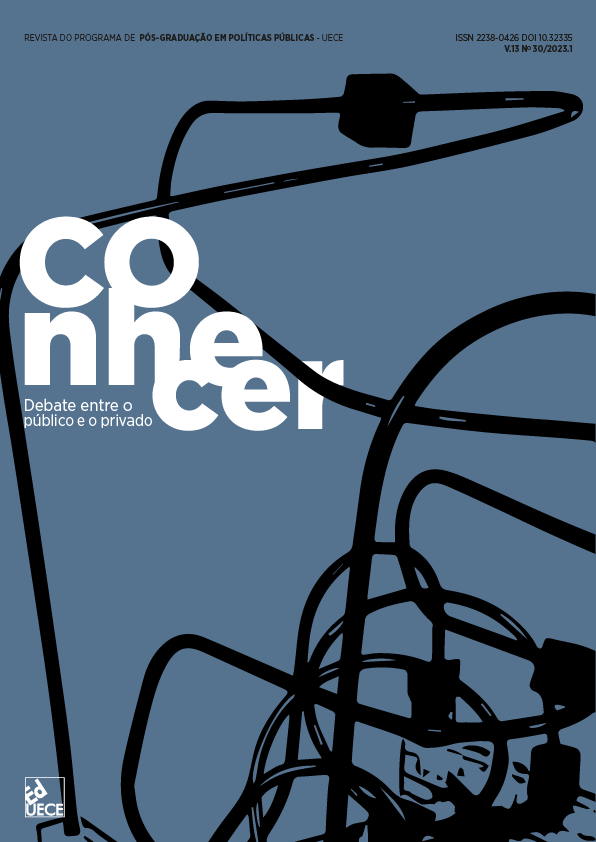APower alternation, federalism, and cultural policy:
the Argentine and Brazilian cases
DOI:
https://doi.org/10.32335/2238-0426.2023.13.30.8681Keywords:
cultural policy, federalism, institutionalizing public policy, intergovernmental coordination, Brazilian National Culture SystemAbstract
This essay reflects on how Argentine and Brazilian cultural policy fit into the federalist models of their respective countries, emphasizing policy institutionalization and power alternation, more specifically resuming the neoliberal agenda after the election of Maurício Macri and Jair Bolsonaro, which sought to deconstruct a perspective of intergovernmental coordination that had been underway since 2003 in the administrations of the Kirchners, in Argentina, and the Workers’ Party (Partido dos Trabalhadores [PT]), in Brazil. To do so, a bibliographic review was carried out, highlighting the socio-historical and political variables, as well as a review of the genesis of institutionalizing public policy. Thus, by identifying political and institutional frameworks, which in the case of cultural policy are directly linked to the Ministries of Culture in Argentina and Brazil or their political-administrative equivalents, progress was made in understanding the positions of central governments in the processes of articulation or disarticulation of cultural policy. Argentine and Brazilian cultural policy still suffer from poor institutionality. This is not a specificity of cultural policy, however, such policies suffer from an acute institutional weakness that puts them in prominence in relation to other social policies. However, unlike Argentina, in terms of cultural policy, Brazil sought to advance in the constitution of systems, appreciating relationships based on republicanism, while Argentina has invested in a direct relationship between administrations with a similar political identity. Even so, the period that followed these administrations has delayed or stagnated the few institutional advances in cultural policy.
Downloads
References
Abrucio, F. L., Grin, E. J., Franzese, C., Segatto, C. I., & Couto, C. G. (2020). Combate à COVID-19 sob o federalismo bolsonarista: um caso de descoordenação intergovernamental. Revista de Administração Pública, 54(4), 663-677.
Alonso, P. (2020). Políticas culturales en la Argentina: un recorrido por sus principales planes (1983-2019). Instituto Nacional de la Administración Pública.
Anderson, G. (2009). Federalismo: uma introdução. Ed. FGV.
Arretche, M. (1999). Políticas sociais no Brasil: descentralização em um Estado federativo. Revista Brasileira de Ciências Sociais, 14(40), 111-141
Arretche, M. (2004). Federalismo e políticas sociais no Brasil: problemas de coordenação e autonomia. São Paulo em Perspectiva, 18(2), 17-26.
Bakke, K. (2015). Decentralization and intrastate struggles. Cambridge University Press.
Bonet, L., & Négrier, E. (2011). The end(s) of national cultures? Cultural policy in the face of diversity. International Journal of Cultural Policy, 17, 574-589.
Braz, M. (2017). O golpe nas ilusões democráticas e a ascensão do conservadorismo reacionário. Serviço Social & Sociedade, 128, p. 85-103.
Burgess, M. (2006). Comparative federalism: theory and practice. Routledge.
Camacho, C. (2002). Propuesta de un nuevo diseño competencial para el federalismo mexicano. In J. M. La Garza (Coord.), Federalismo y regionalismo: memoria del VII Congreso Iberoamericano de Derecho Constitucional (pp. 15-22). Universidad Nacional Autónoma de México.
Campos, G. J. B. (2001). Tratado elemental de derecho constitucional argentino. Ediar.
Carmagnani, M. (Coord.). (1993) Federalismos latinoamericanos: México, Brasil, Argentina. Fondo de Cultura Económica.
Constituição da República Federativa do Brasil, de 5 de outubro de 1988. (1988). Brasília, DF.
Devoto, F., & Fausto, B. (2008). Argentina-Brasil 1850-2000: un ensayo de historia comparada. Sudamericana.
Draibe, S. M., & Riesco, M. (2009). El Estado de bienestar social en América Latina: una nueva estrategia de desarrollo. Fundación Carolina.
Fernández, S. F. (2003) El federalismo en América Latina. Cuadernos Constitucionales México-Centroamérica, 41, 707-709.
Ferreri, J. H. (1995). A federação. In C. Bastos (Org.), Por uma nova federação. Revista dos Tribunais. Forum of Federations. (n. d.). The global Network on Federalism and Devolved Governance. www.forumfed.org/contries
Harvey, E. (2014). Políticas culturales en América Latina. Evolución histórica, instituciones públicas, experiencias. Iberautor.
Morató, A. R., & Zamorano, M. M. (2018). Introduction: cultural policies in Ibero-America at the beginning of the XXI century. International Journal of Cultural Policy, 24(5), 565-576.
Pozzer, M. R. O. (2011). Políticas públicas para o patrimônio cultural na América Latina: a experiência brasileira e equatoriana e o papel do Banco Interamericano de Desenvolvimento (Dissertação de Mestrado). Universidade de São Paulo, São Paulo, SP.
Pozzer, M. R. O. (2015). Os paradigmas da administração pública e as políticas de patrimônio cultural em museus de Brasil e México (Tese de Doutorado). Universidade de São Paulo, São Paulo, SP.
Prato, A. V., & Segura, M. S. (Orgs.). (2018). Estado, sociedad civil y políticas culturales: rupturas y continuidades en Argentina entre 2003 y 2017. RGC.
Regis, A. (2009). O novo federalismo brasileiro. Forense.
Rosas, J. R. L. (1996). Historia constitucional argentina. Astrea.
Selwood, S. (2010). Centre/periphery: devolution/federalism: new trends in cultural policy. Cultural Trends, 19, 1-2.
Watts, R. L. (2006). Origins of cooperative and competitive federalism. In S. L. Greer (Org.), Territory, democracy and justice (pp. 201-223). Palgrave Macmillan.
Zamorano, M. M. (2016). La transformación de las políticas culturales en Argentina durante la primera década kirchnerista: entre la hegemonía y la diversidad. Revista de Ciencias Sociales, 70, 53-83.
Zippelius, R. (1997). Teoria geral do Estado. Fundação Caloustre Gulbenkian.
Downloads
Published
How to Cite
Issue
Section
License
Copyright (c) 2023 Conhecer: debate entre o público e o privado

This work is licensed under a Creative Commons Attribution 4.0 International License.
Authors who publish in this journal agree with the following terms:
- Authors retain the copyright and grant the journal the right of first publication, and the study is simultaneously licensed under the Creative Commons Attribution License, which allows sharing the study by acknowledging authorship and initial publication in this journal.



